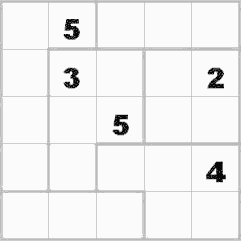Tool/Solver solve Tectonic / Kemaru / Suguru automatically or step by step. The goal of the Tectonic game is to fill the squares of a grid with the numbers 1 to N.
Tectonic Solver - dCode
Tag(s) : Number Games
dCode is free and its tools are a valuable help in games, maths, geocaching, puzzles and problems to solve every day!
A suggestion ? a feedback ? a bug ? an idea ? Write to dCode!
Tectonic Solver
Solve a Tectonic grid
Answers to Questions (FAQ)
What is a Tectonic? (Definition)
Tectonic (also called Kemaru or Suguru) is a digital logic game where the user fills a grid with numbers. Tectonic is played on a grid divided into regions of 1 to N squares that the player must fill in with numbers.
A Tectonic grid follows 2 rules: each block must contain the numbers 1 to N (without repeating numbers) and each cell must be different from its neighbors (including diagonally).
How to use the Tectonic solver?
How does the step by step works?
The program approaches the resolution of a Tectonic in a similar way to a human, evaluating the possibilities in each box and making deductions.
— Only possible value: this cell can only contain this specific value, other values do not respect the rules.
— Only possible cell: this value cannot be present in the other boxes of the block or region.
With each cell or number validation, the solver exposes an additional step in its progress for better understanding.
Sometimes the reasoning reaches a dead end where no immediate logical deduction can be made, leaving several possible values for a cell. In such situations, the solver analyzes the boxes with the fewest possibilities and chooses a value that it believes to be the most likely. If it encounters an inconsistency (i.e. if the grid no longer has a solution), it returns to the selection step and tries another value. To maximize the chances of success, the selection is not random; the choice is made by favoring a value which, once placed in the cell, will allow the maximum number of deductions in the rest of the tectonic. This approach is the fastest for the solver, although it may sometimes be possible to obtain the same result by a more complex and slower deduction.
How to properly start a grid?
The best strategy is one that narrows down the number of possibilities and helps fill in the boxes with numbers. Some tips:
— Identify the regions of the grid, especially the small regions of one or two squares for which the numbers are obvious.
— Start with regions and boxes with neighbors with many numbers already placed.
What is a block?
In a Tectonic, the grid presents regions sometimes called blocks (or groups, or sectors or sub-grids).
Source code
dCode retains ownership of the "Tectonic Solver" source code. Any algorithm for the "Tectonic Solver" algorithm, applet or snippet or script (converter, solver, encryption / decryption, encoding / decoding, ciphering / deciphering, breaker, translator), or any "Tectonic Solver" functions (calculate, convert, solve, decrypt / encrypt, decipher / cipher, decode / encode, translate) written in any informatic language (Python, Java, PHP, C#, Javascript, Matlab, etc.) or any database download or API access for "Tectonic Solver" or any other element are not public (except explicit open source licence). Same with the download for offline use on PC, mobile, tablet, iPhone or Android app.
Reminder: dCode is an educational and teaching resource, accessible online for free and for everyone.
Cite dCode
The content of the page "Tectonic Solver" and its results may be freely copied and reused, including for commercial purposes, provided that dCode.fr is cited as the source (Creative Commons CC-BY free distribution license).
Exporting the results is free and can be done simply by clicking on the export icons ⤓ (.csv or .txt format) or ⧉ (copy and paste).
To cite dCode.fr on another website, use the link:
In a scientific article or book, the recommended bibliographic citation is: Tectonic Solver on dCode.fr [online website], retrieved on 2026-01-05,

